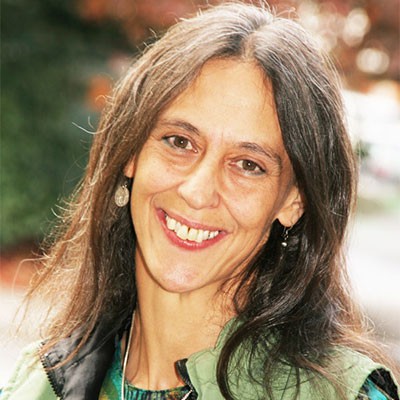
Joanne Arnott
Joanne Arnott is a Métis/mixed-blood writer and arts activist, originally from Manitoba, now at home on the west coast.
She has received the Gerald Lampert Award (LCP 1992) and the Vancouver Mayor’s Art Award for Literary Arts (2017). She has published six poetry books, a collection of short non-fiction and a children’s illustrated.
Recent publications include her third poetry chapbook, Pensive & beyond (Nomados Press 2019) and the co-edited volume, Honouring the Strength of Indian Women: Plays, Stories and Poetry by Vera Manuel (U of Manitoba Press 2019).
Along with being a poetry mentor for the Writer's Studio at Simon Fraser University, she is a poetry editor for EVENT Magazine.
Joanne has been named to the Jack and Doris Shadbolt Fellowship in the Humanities program and will be on sabbatical for 2022.
Joanne’s advice for Writer’s Studio applicants
What are you looking for in your workshop group?
I am looking for a variety of people with different levels of expertise, life experience, and interests. I am selecting writers who show potential and/or panache, a mix of talent who might cross-fertilize in a deepening, perfecting, and satisfying way. I enjoy reading the works of careful wordsmiths, and writers with a lot of heart, and I particularly enjoy the collective conversation that transpires when writers come together.
As mentor I will lead you through a series of writing experiments that build upon one another, develop agreements between writers on useful communications, and encourage you to hone your ability to say what you mean, both in writing and in relation to one another’s works. Curiosity and keen listening are definite assets, as we co-create a supportive community of distinct, unique voices.
What do you look for when reading an applicant’s submission?
The application is our first chance to “meet” you, and your first and best chance to introduce yourself to the mentors. The three parts of the application are distinct genre: cover letter, writing resumé (or CV) and portfolio.
In the cover letter, I look for the personal voice, formal or informal, very communicative or brief and precise. There is no right or wrong way to write your letter, but, an awareness that this is a personal communication between persons is important. I gather an impression from this portion of the application, and move on to…
Writing resumé (or curriculum vitae): a brief summary of your work and studies related to writing in particular, and more broadly. Usually this is less personal, more documentary: I’ve written and published but not studied, I’ve studied and written but not published: an overview of where you’ve been and what you’ve done as a writer. I do not favour more educated over less educated, more published over less published: I am simply gathering impressions, adding these to my earlier impressions from your cover letter, and moving along to…
Portfolio: here is your opportunity to showcase your work, the variety of your interests, the best of your craft.
Having gathered my impressions from each of these portals, I consider the applicant in relation to two questions: do I have something to contribute to this writer’s journey? Would this person be an asset in the collective conversation in the workshop space?

